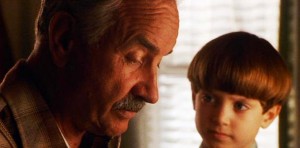 In the final scene of Barry Levinson’s 1990 film, “Avalon,” Michael, the grandson (played as a child by Elijah Wood and by Tom Wood as an adult), is now all grown up, with a son of his own, and on yet another Thanksgiving, he goes to the nursing home to visit his grandfather, Sam, who is now quite forgetful and aged.
In the final scene of Barry Levinson’s 1990 film, “Avalon,” Michael, the grandson (played as a child by Elijah Wood and by Tom Wood as an adult), is now all grown up, with a son of his own, and on yet another Thanksgiving, he goes to the nursing home to visit his grandfather, Sam, who is now quite forgetful and aged.
Sam says:
A couple years ago, I went to see the house on Avalon. It was gone. Not just the house but the whole neighborhood. I went to see the ballroom where me and my brothers used to play. The whole place gone. Not just that. But the grocery store where we used to shop. Gone. All gone. Gone. I went to see where Eva lived of Poplar Street. It isn’t there. Not even the street. And then I went to see the nightclub I used to have. (Laughs to himself) And thank God, it was there! Because for a moment, I thought I never was….
It’s a movie that I’ve used in classes on a variety of occasions over the years (sometimes with an especially good essay on the film by Bruce Lincoln [published in 1996]); I’m using the film now, in fact, in an upper-level course on the politics of origins narratives. But that one closing quote, above, so nicely exemplifies the situated, social self that it would be worth sitting through the film’s two hours of complex family dramas just to get to the point of considering how the patriarch’s sense of himself, his identity, results from his place among those around him — a sense threatened as each building topples and as each family member departs.
If I knew things would no longer be here, I would have tried to have remembered better….
